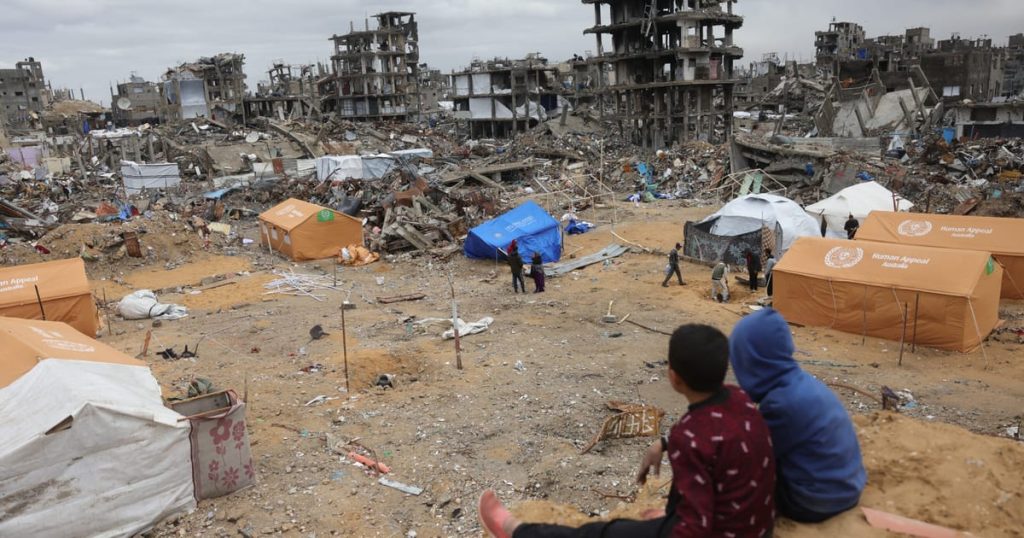In recent weeks, the situation in the Middle East has taken a dramatic turn, with former U.S. President Donald Trump proposing a controversial plan to redefine the region’s political and geographic landscape. Speaking alongside Israeli Prime Minister Benjamin Netanyahu, Trump suggested that the United States should take control of the Gaza Strip, relocate Palestinians to other areas, and transform the contested territory into what he referred to as the “Riviera of the Middle East.” This bold and divisive idea has sparked widespread debate, with critics arguing that such a move would not only displace thousands of Palestinians but also undermine international law and the principles of self-determination. Netanyahu, a longtime ally of Trump, has expressed openness to the idea, stating that it is “worth listening carefully to this proposal.”
The proposal has drawn sharp criticism from legal experts and human rights advocates, who argue that it violates fundamental principles of international law. Among them is Navanethem Pillay, a renowned former judge of the International Criminal Court (ICC) and the special court that prosecuted those responsible for the Rwandan genocide. Pillay has condemned not only Trump’s proposal but also the broader context of U.S. policies toward the ICC, particularly sanctions imposed on the court in retaliation for its investigation into alleged war crimes committed by Israeli leaders. The ICC has issued an arrest warrant for Netanyahu for his role in alleged war crimes, a move that has been met with fierce resistance from Israel and its allies. Pillay has emphasized that “international law applies equally, without double standards for a state’s friends,” highlighting the need for accountability regardless of political alliances.
The international community has rallied in defense of the ICC, with a coalition of nearly 80 countries issuing a joint statement last Friday. In their statement, these nations warned that the sanctions imposed by the U.S. on the ICC could have far-reaching consequences, including the closure of the court’s field offices and the undermining of its ability to conduct investigations. This show of solidarity underscores the global commitment to upholding the rule of law and ensuring that those responsible for serious crimes are held accountable. However, the stance of the U.S. and Israel has created a significant rift, with both countries arguing that the ICC lacks jurisdiction over their actions and that its investigations are politically motivated.
Pillay, who made history as the first non-white woman to serve on the bench of South Africa’s High Court, has also weighed in on the broader issue of Israel’s treatment of Palestinians. She has expressed support for an ICC investigation into allegations of apartheid committed by Israel in its occupation of Palestinian territories. “Apartheid is one of the manifestations of control there,” she explained, drawing parallels to the system of racial segregation that once dominated South Africa. Pillay noted that the international community played a crucial role in ending apartheid in her home country through economic sanctions and diplomatic pressure, suggesting that similar measures could be effective in addressing Israel’s actions. Apartheid is classified as a crime against humanity under the Rome Statute, the founding treaty of the ICC, making it a viable basis for prosecution.
Despite her belief in the merits of such an investigation, Pillay acknowledged the complexities of pursuing charges for crimes that have not been previously prosecuted. “I don’t see [ICC prosecutor] Karim Khan charging that crime,” she said. “I was a judge on that court, I understand that it’s a bit complicated to charge a crime that has never been charged before … but if apartheid comes up, sure I will support it.” Pillay’s own commission, operating under the United Nations Human Rights Council, has already taken steps to investigate these allegations. Last October, the commission accused Israel of war crimes and crimes against humanity, citing the deliberate destruction of Gaza’s health system as evidence. Israel has vehemently denied these allegations, and last Wednesday, it withdrew from the U.N. Human Rights Council, accusing the body of “discrimination” and “antisemitism.”
The ongoing debate over Trump’s proposal, the ICC’s investigations, and Israel’s withdrawal from the U.N. Human Rights Council reflects the deepening polarization over the Israeli-Palestinian conflict. As the international community grapples with how to address these issues, voices like Pillay’s remind us of the importance of upholding the rule of law and holding all nations accountable for their actions. Whether through diplomatic pressure, economic sanctions, or legal proceedings, the path forward will require a commitment to justice and human rights, even in the face of intense political opposition. The situation in the Middle East remains a complex and contentious issue, with far-reaching implications for global stability and the principles of international law.
